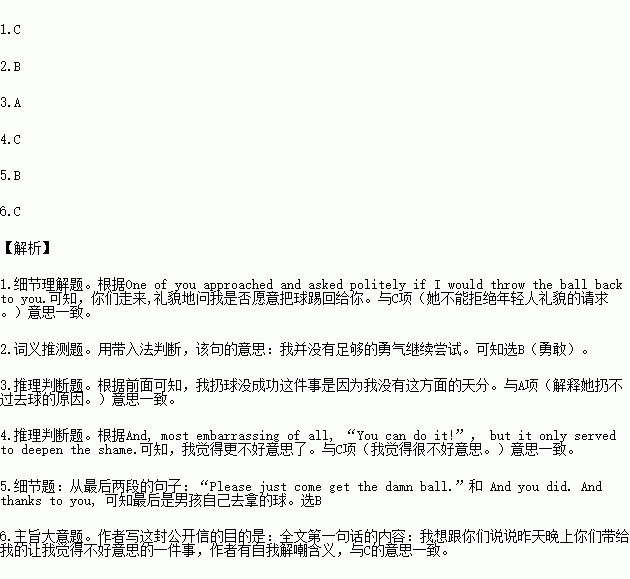题目内容
D
Dear Guys,
I’d like to talk to you about the shame you subjected me to last night. Let me first refresh your memory: You, a group of fit, young men, were playing soccer on the field across from my apartment building. I, a better-than-average looking young woman, was walking along the sidewalk with my groceries. That’s when your ball came flying over the fence and landed in front of me.
One of you approached and asked politely if I would throw the ball back to you. Fighting the urge to drop my bags and run screaming down the street, I reluctantly (勉强地) agreed.
Before I continue, let me explain something that I didn’t have a chance to mention last night: I hate sports. More specifically, I hate sports involving balls. This results from my lack of natural ability when it comes to throwing, catching and hitting. I’m bad at aiming too. So you can understand why I’d be nervous at what I’m sure seemed to you like a laughably simple request.
However, wanting to appear agreeable, I put my bags down, picked up the ball and, eyes half-shut, and threw it as hard as I could.
It hit the middle of the fence and bounced back to me.
Trying to act casually, I said something about being out of practice, and then picked up the ball again. If you’ll remember, at your command, I agreed to try throwing underhand. While outwardly I was smiling, in my head, I was praying, oh God, oh please oh please oh please. I threw the ball upward with all my strength, terrified by what happened next.
The ball hit slightly higher up on the fence and bounced back to me.
This is the point where I start to take issue with you. Wouldn’t it have been a better use of your time, and mine, if you had just walked around the fence and took the ball then? I was clearly struggling; my smiles were more and more forced. And yet, you all just stood there, motionless.
Seeing that you weren’t going to let me out of the trouble, I became desperate. Memories of middle school softball came flooding back. I tried hard to throw the ball but it only went about eight feet, then I decided to pick it up and dash with ball in hand towards the baseline, while annoyed thirteen-year-old boys screamed at me that I was ruining their lives. Children are cruel.
Being a big girl now, I pushed those memories aside and picked up the soccer ball for the third time. I forced a good-natured laugh while crying inside as you patiently shouted words of support over the fence at me.
“Throw it granny-style!” one of you said.
“Just back up a little and give it all you’ve got!” another offered.
And, most embarrassing of all, “You can do it!”
I know you thought you were being encouraging, but it only served to deepen the shame.
Anyway, I accepted your ball-throwing advice, backed up, rocked back and forth a little, took a deep breath and let it fly.
It hit the edge of the fence and bounced back to me.
I surprised myself—and I’m sure you as well—by letting out a cry, “DAMN IT!!!” I then willed myself to have a heart attack and pass out in front of you just so I’d be put out of my misery.
Alas, the heart attack didn’t happen, and you continued to look at me expectantly, like you were content to do this all night. I had become a sort of exhibition for you. I could feel your collective thoughts drifting through the chain-link: “Can she really not do it? But I mean, really?”
Unfortunately for you, I wasn’t really game to continue your experiment. Three failed attempts at a simple task in front of a group of people in a two-minute period were just enough blows for me for one night. I picked up the ball one last time, approached the fence and grumbled, “Please just come get the damn ball.”
And you did. And thanks to you, I decided at that very moment to never throw anything ever again, except disrespectful glances at people who play sports.
Sincerely, Jen Cordery
1.The writer agreed to throw the ball because ______.
A. she needed to have a relax carrying the heavy groceries
B. she wanted to refresh her childhood memories
C. she could not refuse the polite request from the young man
D. she had fallen in love with the young man at first sight
2.Which of the following is closet in meaning to the underlined word “game”?
A. anxious B. brave C. afraid D. curious
3.Why did the writer mention her middle school memory?
A. To explain why she failed the attempts to throw the ball back.
B. To complain that she had not mastered the ball throwing skills.
C. To show how cruel those 13-year-old boys were.
D. To express her dislike towards softball.
4.What the boys said before the writer’s third attempt actually made the writer ________.
A. inspired B. encouraged C. awkward D. depressed
5.What happened to the ball at last?
A. The writer managed to throw the ball back.
B. The boy got the ball back by himself.
C. The writer threw the ball away out of anger.
D. The boys got angry and left without the ball.
6.What’s the writer’s purpose in writing this open letter?
A. To express her regret over what she did the day before.
B. To announce that she would never play all games again.
C. To joke on her inability to throw the ball over the fence.
D. To criticize the young men for their cruelty to her dignity.

